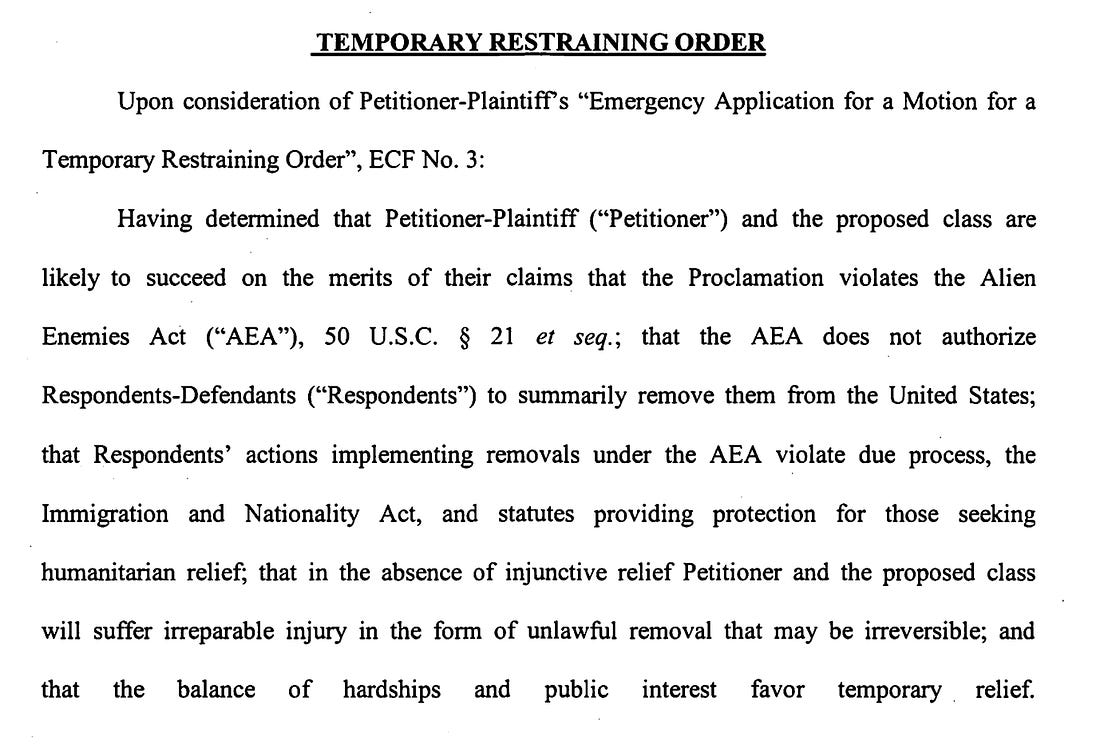Stand Up to the BullyIt's Donald Trump versus the United States, and it's up to us to make sure he doesn't win.Today, Donald Trump has been on a tirade, multiple tirades actually, unbefitting the president of the United States. You know that, and there is nothing good to be gained by focusing on the people he has singled out. It’s part of his ongoing pattern of abusing the powers of the presidency to publicly seek retribution or punish people he considers to be his enemies. Trump doesn’t make us guess about this. He’s said the quiet part out loud on multiple occasions, like these:
All told, during campaign season, Trump made over 100 threats to prosecute or punish people he perceived as enemies. We’ve seen him make good on that in a series of executive orders, some cloaked in the pretense of concern over anti-Semitism or discrimination (which now means failing to protect white Christians), that target individuals or institutions he thinks have done him wrong. His public directions, presumably to Attorney General Bondi, to investigate people or entities are part and parcel of it. As are the social media posts attacking people, often just for doing their jobs. It’s no way for the president to run the White House. But elections have consequences, and this is among them following 2024, when just enough Americans stayed home, or bought fake concerns about Biden’s economy, or wanted a change. Some people are so inured to Trump’s bad behavior that they shrug their shoulders and pass it off as “just Trump.” When you hear people doing that, stop and remind them that this isn’t normal or innocent. He is literally on a revenge tour and abusing the powers of the presidency. As for us, we have the opportunity to put a stop to this because we still have the right to vote—we need to prepare to exercise it while we can and take steps to protect free and fair elections ahead of 2026, which will be upon us sooner than you might think. Our tradition of democracy is what makes us different. It’s instilled in us from a young age through classroom elections and developed in democratically elected city and county governments and with the opportunity to vote for our state and federal officials. Even if we take it for granted, democracy is the structure we build our lives upon, and that’s an advantage in a time like ours. It is much easier to insist upon maintenance of something you are used to having than to demand something you’ve never had. In the Philippines, under Ferdinand Marcos, what became an increasingly repressive environment and authoritarian rule finally led millions of people to take to the streets in protest after two decades, when he tried to engage in election fraud. That provoked a military defection that led Marcos to flee the country. We don’t have to wait 20 years to protest. We have the right to do it and are already doing it. We need to make sure we understand the power we have as voters and fully exercise it to keep our country from becoming a lapsed democracy. The Soviet-backed Communist regime in Poland fell to the Solidarity trade union, led by Lech Wałęsa. The labor movement began as a demand for workers’ rights and evolved into a call for freedom from the Communist government’s control. Despite government crackdowns and the imposition of martial law, the movement grew, leading to semi-free elections and the fall of Communism in Poland, which opened the door for the rest of Eastern Europe. We don’t have to go through a struggle of that length and magnitude. But we do have to insist upon our right to vote and, most importantly, bring more of our fellow citizens along with us in 2026. During the Civil Rights Movement, governors like Alabama’s George Wallace tried to maintain systemic racism. But Americans used boycotts, marches, and civil disobedience to challenge racist Jim Crow laws and defy bullies, like governors and police officials that stood with those who would deny Black people’s equality. It was everyday citizens and the leaders who emerged from the movement who succeeded. Americans know how to do that. There is enormous power in nonviolent resistance and collective outrage when it is sustained. It educates and motivates. Americans have that innate ability in their bloodstream. From 1773 and the Boston Tea Party to modern-day protests against an American president who wants to usurp the power that the Constitution assigns to Congress and the Judiciary, we know how to protest efforts to degrade our democracy. Standing up to the bully works—in fact, it’s the only option. Ignoring it won’t make it go away. But our history is full of evidence that we know how to turn the tide. By 1971, Vietnam veterans who were against the war had had enough. Led by future Senator John Kerry, they gathered in D.C. for weeklong protests called Dewey Canyon III in April of that year. The protest started with under a thousand veterans and Gold Star parents who marched, camped on the National Mall, and famously threw their medals on the steps of the Capitol in protest of the war. Their actions brought national attention to the moral and human costs of the war, helping shift public opinion and apply pressure on policymakers. Courage is contagious, and knowledge is power—no matter how many times you hear those sayings, they remain true. In the 1950s, under McCarthyism and the “Red Scare,” people were afraid to push back against the bully, Senator Joseph McCarthy, whose aggressive and frequently baseless accusations against people he didn’t like in government, entertainment, and academia ruined lives. He called people communist traitors despite the absence of any evidence of it. He used public hearings and fear to consolidate power. People didn’t stand up because they were afraid of being labeled Communists themselves. The media, for the most part, repeated his claims until very late stages, and very few politicians of the day were willing to challenge his tactics, thinking only of self-preservation. Even President Eisenhower avoided confrontation with him until the end. McCarthy destroyed careers. People’s exercise of First Amendment rights was chilled. An atmosphere of fear prevailed. McCarthy’s power grew because of silence and self-preservation. It only came to an end when others finally said “enough.” It didn’t take an army or a rebellion. It took American common sense and persistence. Early in 1954, McCarthy, who had asked for preferential treatment for an aide on his subcommittee who was drafted and apparently not received full satisfaction, decided to go after the Army, with an allegation that security at a top secret facility was inadequate. There were three months of nationally televised hearings. Senate records tell the story of how it all ended like this: “The army hired Boston lawyer Joseph Welch to make its case. At a session on June 9, 1954, McCarthy charged that one of Welch’s attorneys had ties to a Communist organization. As an amazed television audience looked on, Welch responded with the immortal lines that ultimately ended McCarthy's career: ‘Until this moment, Senator, I think I never really gauged your cruelty or your recklessness.’ When McCarthy tried to continue his attack, Welch angrily interrupted, ‘Let us not assassinate this lad further, senator. You have done enough. Have you no sense of decency?’” It was suddenly over, and seemingly overnight, McCarthy’s hold on the country disappeared. His Senate colleagues and his party abandoned him; the media stopped parroting his accusations. Three years later, he was dead. Challenge the bully. Don’t let him have his way. As with McCarthy, sometimes it just takes one courageous moment to puncture the balloon. Maybe we will have a moment like that. But even if we don’t, the way to challenge the bully is by voting. In 2026, every seat in the House of Representatives will be on the ballot as will 33 seats in the Senate. If you want to ask Trump, “Have you no sense of decency?” make him face Democratic majorities in both bodies of Congress. Members of the military fought and lost their lives to protect our country. All we have to do is vote. We’re in this together, Joyce |
Search This Blog
Tuesday, May 27, 2025
Stand Up to the Bully
Monday, May 26, 2025
Memorial Day & the Time the Secretaries of Defense Stood Up To Trump
Memorial Day & the Time the Secretaries of Defense Stood Up To Trump
Memorial Day was originally called Decoration Day, a time to place flowers on the graves of those who fell in the Civil War. Over time, it has taken on its modern form of remembrance, where we honor and remember people who made the ultimate sacrifice for the country, and for all of us, while serving in our military. So many of us have personal memories of family members and friends who served, and who fought, and who, in some cases, lost their lives. It is a deeply personal day in that sense. I was touched this morning reading Norm Eisen’s column at the Contrarian, where he spoke about both of his parent; his Mom, who was liberated from captivity at the hands of the Nazis by Americans liberating Germany at the end of World War II and his Father, who served in the military. Norm concludes that “Some might say we should simply remember our lost soldiers today, without tarnishing that tribute by addressing our political climate. But to my mind, looking away squanders their sacrifice. It is our responsibility to be candid about the crisis and to honor their service more urgently than ever.” I couldn’t agree more. I know with certainty that my Grandfather, who loved the U.S. Navy where he served until the day he died, and who taught me what it meant to be an American, would have felt the same way. Today, as we honor the military, I think about an act of incredible service performed by all ten of the living former Secretaries of Defense: Ashton Carter, Dick Cheney, William Cohen, Mark Esper, Robert Gates, Chuck Hagel, James Mattis, Leon Panetta, William Perry and Donald Rumsfeld, on January 3, 2021. That morning, they wrote in the Washington Post together, regardless of political party, they took a stand for the only thing that mattered in the moment, our country. The headline read: “All 10 living former defense secretaries: Involving the military in election disputes would cross into dangerous territory.” They wrote simply and plainly, to make sure the entire country understood, and perhaps most importantly, the brand new leadership at the Pentagon, because Trump fired his Secretary of Defense, Mark Esper, in a Tweet on November 9, after he lost the election. Trump appointed Chris Miller in his place and sent along a now-familiar name, Kash Patel, to act as his Chief of Staff. You don’t have to be a Washington insider to understand that when a lame duck president does this, there is mischief afoot. The former secretaries, now joined by Mark Esper, wrote to dispel any illusion that the military could or should play a role in determining the outcome of the 2020 election. Trump was becoming increasingly desperate. He was running out of options. There had been some talk of using the military to seize voting machines or perhaps intervene for the president in other, even more nefarious ways. Headed into January 6, the Secretaries wrote to the American people: “As former secretaries of defense, we hold a common view of the solemn obligations of the U.S. armed forces and the Defense Department. Each of us swore an oath to support and defend the Constitution against all enemies, foreign and domestic. We did not swear it to an individual or a party. American elections and the peaceful transfers of power that result are hallmarks of our democracy. With one singular and tragic exception that cost the lives of more Americans than all of our other wars combined, the United States has had an unbroken record of such transitions since 1789, including in times of partisan strife, war, epidemics and economic depression. This year should be no exception. Our elections have occurred. Recounts and audits have been conducted. Appropriate challenges have been addressed by the courts. Governors have certified the results. And the electoral college has voted. The time for questioning the results has passed; the time for the formal counting of the electoral college votes, as prescribed in the Constitution and statute, has arrived. As senior Defense Department leaders have noted, “there’s no role for the U.S. military in determining the outcome of a U.S. election.” Efforts to involve the U.S. armed forces in resolving election disputes would take us into dangerous, unlawful and unconstitutional territory. Civilian and military officials who direct or carry out such measures would be accountable, including potentially facing criminal penalties, for the grave consequences of their actions on our republic. Transitions, which all of us have experienced, are a crucial part of the successful transfer of power. They often occur at times of international uncertainty about U.S. national security policy and posture. They can be a moment when the nation is vulnerable to actions by adversaries seeking to take advantage of the situation. Given these factors, particularly at a time when U.S. forces are engaged in active operations around the world, it is all the more imperative that the transition at the Defense Department be carried out fully, cooperatively and transparently. Acting defense secretary Christopher C. Miller and his subordinates — political appointees, officers and civil servants — are each bound by oath, law and precedent to facilitate the entry into office of the incoming administration, and to do so wholeheartedly. They must also refrain from any political actions that undermine the results of the election or hinder the success of the new team. We call upon them, in the strongest terms, to do as so many generations of Americans have done before them. This final action is in keeping with the highest traditions and professionalism of the U.S. armed forces, and the history of democratic transition in our great country.” This letter was published just ahead of January 6, and so easily forgotten by the events that occurred just a few days later. But Memorial Day is a day for remembering. And as much as we are grateful to the military for their service, for protecting us and keeping us safe by fighting on the battlefield, today, I’m reflecting on this quiet moment of courage from the military’s civilian leaders. There is much to be grateful for. We’re in this together, Joyce |
Sunday, May 25, 2025
The Week Ahead
The Week AheadMay 25, 2025
This week, we’ll continue to see lawyers in court, trying to prevent the president from taking on exceptional amounts of power that don’t belong to him under the Constitution. That’s the theme to the litigation against the administration across the board, regardless of subject matter: Trump’s relentless effort to accumulate power. It’s worth noting that the more power you have, the easier it is to grift. If you can’t be criminally prosecuted for anything you do, so long as it has a tinge of official action, then you can accept a $37 million plane from the Qataris the same week you hold a dinner for people who purchased $148 million dollars’ worth of your meme coin (it’s a measure of the man that attendee reported that the food “sucked”). Grift aside—and we’re sure to see more this week, because when don’t we?—a major focus this week will be the immigration/deportation cases. There are so many that it’s difficult to keep them straight. Tonight, we’ll do an overview of what we can expect this week, so you’ll have the background you’ll need for each case as it pops up. Keep in mind the Kilmar Abrego Garcia is still in custody in El Salvador. And, as my friend Allegra Lawrence-Hardy, an extraordinary Georgia litigator keeps reminding me, American citizen children were deported and sent to Honduras. The administration says their noncitizen mothers insisted on taking the children with them when they were deported, but it turns out that’s likely not the case. One of the children was being treated for a stage four cancer and was deported without any medication. You can safely bet there is a zero percent chance the mom would have agreed to that. There are still hundreds of men in CECOT in El Salvador, others languishing, perhaps still in a cramped airplane that was supposed to take them to South Sudan but is now in Djibouti. As a lawyer for one of those men put it, “my client has disappeared. I do not know where my client is." In other words, the one thing we know is that the Trump administration is pulling out all the stops to make good on the president’s campaign promises about mass deportations. But these are not the dangerous criminals he said he would get off American streets. Here are some of the developments we can expect for the week ahead: D.V.D. v. DHS Last week I wrote to you about this case in a post entitled Welcome to South Sudan. It's the case where the government is trying to remove eight men from the U.S. and send them to one of the most unstable regions in the world. Only one of the men is from South Sudan. The others hail from places like Laos and Vietnam. They have no connections there and assuredly don’t speak the language. This is the case where the plane is currently in Djibouti, and the men’s precise whereabouts are unknown. But Judge Brian Murphy has ordered that they receive a hearing to determine whether they have a reasonable fear of death or torture before they are separated from U.S. custody. Expect to hear more about this one early this week. The Mahmoud Khalil Case Khalil is the green card holder and recent Columbia grad whom ICE arrested after Secretary of State Marco Rubio issued a determination that his role in pro-Palestinian protests merited deportation. Rubio says that Khalil’s presence and activities in the United States “would have potentially serious adverse foreign policy consequences and would compromise a compelling U.S. foreign policy interest.” This was the first of the cases involving students that grabbed the public’s attention. Khalil remains in custody in Louisiana. In the meantime, his wife has given birth to their first child, whom he was finally able to briefly hold while still in ICE detention this past week. A motion for a preliminary injunction that would prevent the government from deporting Khalil while litigation over his claims proceeds—among them, he has argued he is being retaliated against for exercise of his First Amendment rights—has been pending for almost a month now. It’s likely we will see some action in this case this week, especially since Judge Michael Farbiarz has already ruled that he has jurisdiction over the case and can proceed. M.A.P.S. This is a case in the Western District of Texas, following the Supreme Court’s decision that people the Trump administration is trying to deport using the Alien Enemies Act must file suit in the federal district where they are being held. ACLU lawyers have filed to certify a class covering every person in this situation in the Western District. There is a preliminary injunction hearing scheduled for Thursday, and Judge David Briones issued a notice that he may convert it to a “trial on the merits” permanent injunction hearing. Here’s the body of the motion, where the Judge writes, “Based on the arguments raised in Petitioner’s Motion, this Court finds consolidation of the hearing on the motion and the trial on the merits is proper.” That would seem to bode poorly for the government. That’s consistent with the language the Judge used on May 13, when he entered a temporary restraining order using language leaving little doubt about where this is heading. Judge Briones set an expedited briefing schedule for the class certification motion, which is why this will be taken up this week. If you want to know more about class actions, they’re governed by Federal Rule of Civil Procedure 23, which requires the individuals who want to be the “named plaintiffs” representing a class of everyone who is similarly situated to establish that commons claims that can be resolved in the litigation exist among the putative class members. The issue of whether Trump can use the Alien Enemies Act in the way he is trying to, claiming the U.S. is under attack by a foreign gang, is inevitably heading towards the Supreme Court. This case is likely going to be in the mix. A.A.R.P. (Now renamed W.M.M. to avoid confusion with the group of the same name) This case is on remand to the Fifth Circuit from the Supreme Court, which held 7-2 (Alito and Thomas dissenting) that the government failed to provide the petitioners (what we call plaintiffs when a case is before the Supreme Court) with due process. The government gave the men it planned to deport roughly 24 hours’ notice before it intended to remove them. The Court ruled that wasn’t enough. It returned the case to the Fifth Circuit for a decision about what the government has to do to meet its constitutional obligations. I wrote to you about that decision here. The government’s brief to the Fifth Circuit is due on Friday. We’ll read it together when it’s filed. The Supreme Court ordered the Fifth Circuit to consider two separate issues:
The next major event in this case will be oral argument before the Fifth Circuit next month. That’s a lot for a Sunday night during a three-day weekend, but I’m hoping it has all of us prepared for the coming week. I hope today’s post demonstrates why Civil Discourse is worth supporting. Drawing on my 25 years at the Justice Department as a career prosecutor and former U.S. Attorney, I cut through the noise and offer clear, accessible analysis of the legal and political developments reshaping our democracy. I go directly to the source—pleadings, judicial opinions, and other primary materials—to bring you facts and context you can trust and help you think critically about where we are and where we’re headed. If you’re a paid subscriber, thank you. Your support makes this work possible. If you’re not yet, I hope you’ll consider upgrading. If you value independent, expert analysis grounded in real legal experience, you’re in the right place. We’re in this together, Joyce |
Saturday, May 24, 2025
The Democracy Index
The Democracy Index
This week’s edition of The Democracy Index, which you’ll find over at The Contrarian starts with the disgraceful spectacle of Donald Trump forcing South Africa’s President to watch a video portraying patently false accusations by white supremacist that South Africa is conducting a “genocide” of white South African farmers. It ends with a federal judge in California blocking DOGE’s efforts to dismantle our government, at least for now. Head on over and get a look at our Index of how we are doing in the time of Trump. The Democracy Index is a great share with friends and family who have less time to keep up with developments, but still want to understand the throughlines and see what’s happening to our democracy. Our interactive graphic makes it easy to do a deep dive on the issues that interest you the most. The Democracy Index is available for free, because knowledge matters. We’re in this together, Joyce |
Wednesday, May 21, 2025
Graduation Days
Graduation Days
Today I’m recovering from the graduation tour, one in Boulder and one in Boston in the last two weeks, and getting back into the groove of writing as I continue to work on my book (which I hope you’ll preorder if you haven’t already). The graduations came at a good moment. Watching my kids graduate, one from college and one with a master’s in science, was an emotional experience—the culmination of their years of hard work, sacrifice, and growth, all captured in a single walk across the stage. They, like their friends, my law students, and amazing students across the county, now enter society as adults. Even beyond the individual stories of hardships overcome and perseverance, witnessing these rites of passage makes me feel profoundly hopeful. The intelligence and commitment of the students—many of whom are already tackling big problems and imagining new, bold solutions—gives me a level of confidence about what comes next for our country. In a time when it’s easy to get discouraged, their commitment and idealism stands as a powerful reminder that they are ready to take on the mess we have left them. The kids are alright, even though they shouldn’t have to be. Talking with them makes me think they will find a way, even if it’s unfair to ask it of them and despite the fact that their path will be more difficult than it should be. Courage is contagious, and they seem to have caught it. Their educations have prepared them for the future we all find ourselves in now. As students across the country prepared to graduate this year, Trump released his so-called “skinny budget.” If that’s how they want to frame it, then education has been put on a starvation diet—at least the kind of education that develops independent thinkers who thrive in an environment where questions are asked and answered. Trump pitches the budget as “gut[ting] a weaponized deep state while providing historic increases for defense and border security.” Defense spending would increase by 13% under his proposal. The plan for education is titled, “Streamline K-12 Education Funding and Promote Parental Choice.” Among its provisions, the announcement focuses on the following items:
As we discussed in March, none of this is a surprise. Trump is implementing the Project 2025 plan. In December of 2024, I wrote about how essential it is to dumb down the electorate if you’re someone like Donald Trump and you want to succeed. A rich discussion in our forums followed. At the time I wrote, “Voters who lack the backbone of a solid education in civics can be manipulated. That takes us to Trump’s plans for the Department of Education.” But it’s really true for the entirety of democracy. Explaining the expanded funding for charter schools, a newly written section of the Department of Education website reads more like political propaganda than education information: “The U.S. Department of Education announced today that it has reigned in the federal government’s influence over state Charter School Program (CSP) grant awards. The Department removed a requirement set by the Biden Administration that the U.S. Secretary of Education review information on how states approve select entities’ (e.g., private colleges and universities) authorization of charter schools in states where they are already lawful authorizers. This action returns educational authority to the states, reduces burdensome red tape, and expands school choice options for students and families.” There are already 37 lawsuits related to Trump’s changes to education. Uncertainty is no way to educate America’s children. Cutting funding for research because you want to score political points about DEI or climate change is no way to ensure we nurture future scientists and other thinkers and doers. In a March interview on PBS “NewsHour,” John King, the chancellor at The State University of New York, was asked about the Trump administration’s position that “the federal Department of Education has failed in its mission, and thus it can be dismantled.” His response was telling. “Unfortunately,” he said, “they have got it exactly backwards … The Education Department has played a key role in the progress we have made over the last 40 years in terms of student performance. It's when the federal government is leaning in, providing clear accountability, mobilizing the country to improve outcomes, particularly for low-income students, students with disabilities, other vulnerable student populations, that we have seen the most progress. Where we stalled was when the first Trump administration took office, and then certainly COVID set the whole country back.” I am reminded again of George Orwell’s words: “The most effective way to destroy people is to deny and obliterate their own understanding of their history.” The historians among us, and those who delve into history, will play a key role in getting us through this. Our love and understanding of history can help us stay grounded, understanding who we are, who we don’t want to become, and why the rule of law matters so damn much to all of it. This morning at 1 am, yes, that’s 1 AM, to take up what they’ve titled, I kid you not “The Big, Beautiful Budget Bill.” If you can, set your alarm and watch. There is no way we’re letting them get away with this. Here’s the number you call to let your elected officials know how you feel: 202-224-3121 Thanks for being here with me and for supporting Civil Discourse by reading and subscribing. Your paid subscriptions make it possible for me to devote the time and resources necessary to do this work, and I am deeply grateful for them. We’re in this together, Joyce |
Evening Roundup, May 28...plus a special thank you to our Contrarian family
Evening Roundup, May 28...plus a special thank you to our Contrarian family Featuring Jen Rubin, Katherine Stewart, Brian O'Neill, Jenni...

-
01 January 22 Live on the homepage now! Reader Supported News FOCUS: Robert Reich | The Road Ahead Robert Reich, Robert Reich's Su...
-
29 January 22 When You Back RSN You Are Backing Proven Fighters Pressuring the networks, not allowing the real story to go unnoticed, ma...
-
06 October 21 Live on the homepage now! Reader Supported News WHAT’S THE COST OF A CORPORATE INFORMATION MONOPOLY? — Everything? In effect...












